It’s a real poop when a case of dog diarrhea strikes.
Stinky poo puddles signal upset in your sweet dog’s tummy and that leaves a dog parent not only feeling sad but worried.
With so many causes for diarrhea in dogs, it’s hard not to feel concerned. But, diarrhea in dogs is a common occurrence and most cases can be solved at home with some simple steps.
So, bag-and-toss your worries when it comes to dog diarrhea; we’ve got piles of information to help you figure out what’s ailing your pup’s belly. And the first place to start is knowing what your dog’s poop looks like on a regular basis. Sounds weird, but knowing how your dog’s business looks when all is flowing well can help you spot trouble as soon as it deposits itself on the lawn (and maybe the carpet).
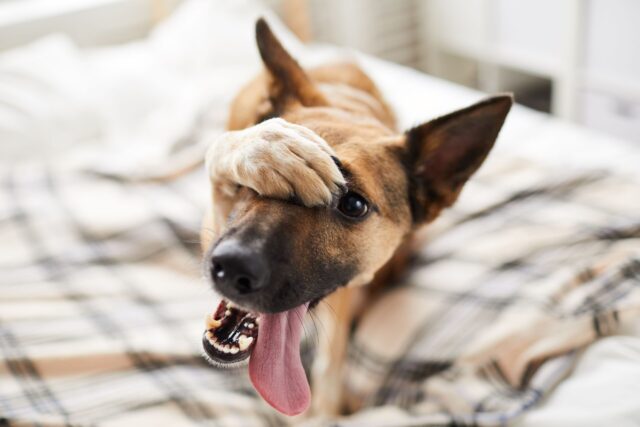
What Should Dog Poop Look Like?
Like snowflakes, every dog’s poop is different thanks to their unique genetics, diet, and health. But Dr. Jessica Vogelsang, DVM, explains a healthy poop appears as “a firm segmented piece, caterpillar shaped, that feels like Play-Doh when pressed.”
As many vets use a 4-C method to gauge dog deposits, Dr. Vogelsang jokes, “You can evaluate poop much like a diamond.”
But the 4-Cs of poop are a little different than those used to evaluate diamonds! To analyze your dog’s feces, examine consistency, color, content, and coating. And when considering dog diarrhea, you’ll notice the consistency appears as extremely loose stools or puddles with no solid form and commonly occurs more frequently than a dog’s normal bowel schedule.
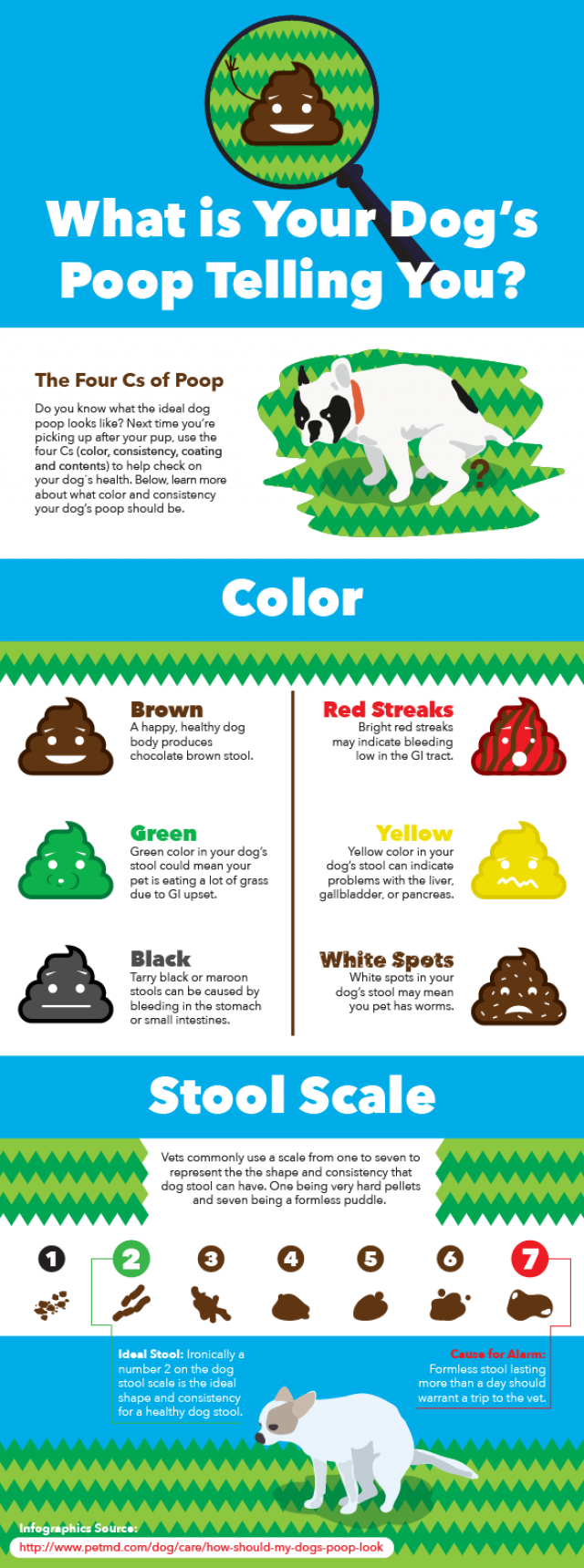
What Causes Diarrhea in Dogs?
Dr. Krista Williams, BSc, DVM, and Dr. Ernest Ward, DVM, explain, “Diarrhea is the result of faster movement of fecal material through the intestine, combined with decreased absorption of water, nutrients, and electrolytes.”
While there are a good number of culprits that could be responsible for your pup’s icky-poo tummy, the most common causes of dog diarrhea are:
- Ingesting suspect food from the garbage or foraging through unknown outdoor refuse, known also as dietary indiscretion or “garbage gut”
- Sudden diet changes
- Experiencing stress from new situations, like traveling or the absence of a dog’s family
While these types of dog diarrhea are often cleared up with treatment at home, there can be other factors behind a dog’s runny poop that require attention from the vet.
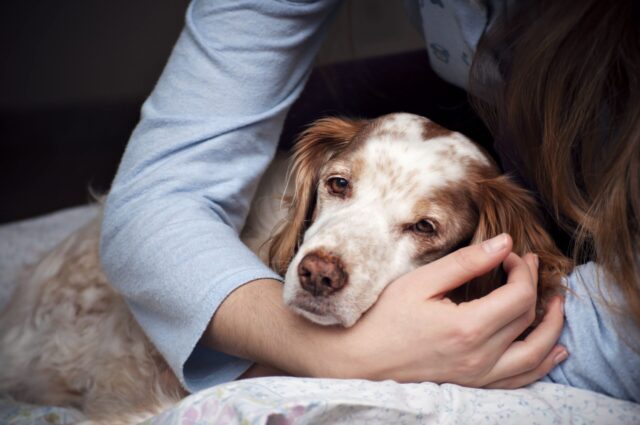
When to See the Vet for Dog Diarrhea
If home treatment for dog diarrhea hasn’t stopped the problem, the upset stomach has lasted for 24 hours, or any of the symptoms listed appear, call the vet for an appointment:
- Blood in your dog’s stool – more than light spotting
- Worms or other unidentifiable creepy-crawlies in the stool
- Heavy mucous in the stool
- Black or tarry stools
- Severe dehydration – These are the five signs you should look for.
- Vomiting
- Hard, bloated belly
- Lethargy
- Fever
- Pale, blue, or gray gums
According to Dr. Ward and Dr. Williams, “If the main sign of illness in your dog is diarrhea, a relatively simple problem such as an intestinal infection from bacteria, viruses, coccidia, or intestinal worms may be the cause.”
While dogs may not present with other symptoms, intestinal invaders will make the runny stuff last, so your dog will need a trip to the vet.
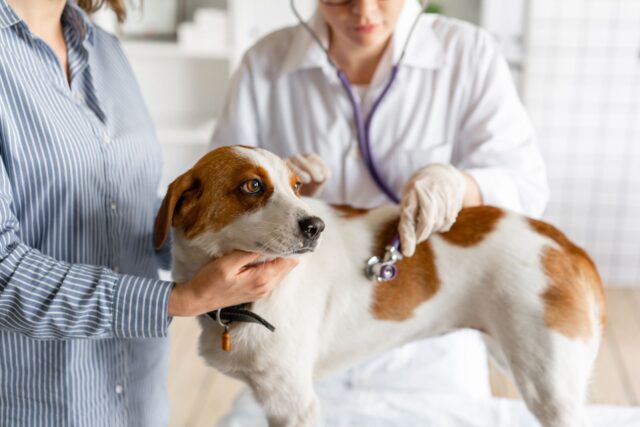
But there are other medical factors in which diarrhea can be a symptom:
- Allergies
- Bacterial infections, such as salmonella
- Viral infections, like parvovirus or distemper
- Parasites, like hookworms, whipworms, or roundworms to name a few
- Bowel obstruction from eating toys, socks, or any other indigestible materials
- Consumption of toxic plants or household chemicals
- Medication sensitivities
- Inflammatory diseases, like inflammatory bowel disease or colitis
- Metabolic issues, diabetes, and thyroid problems for example
- Cancer
There’s a wide array of things that can cause diarrhea in dogs, and this list covers a good number. It’s enough to prove lasting dog diarrhea should be treated by a vet.
At the Vet for Dog Diarrhea
At the vet, the doctor will run tests and ask questions. Be ready with answers, like when the diarrhea started, what color it is, and any other symptoms.
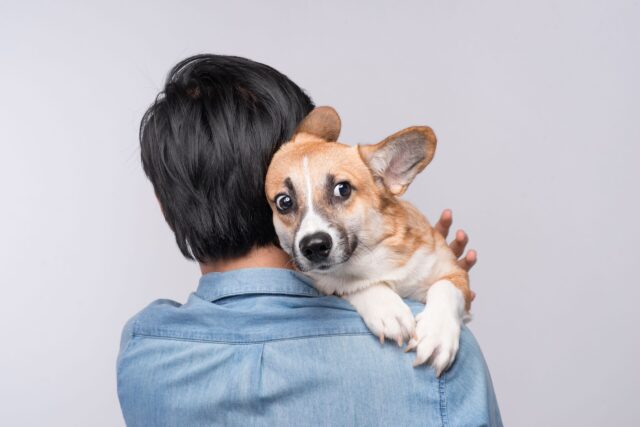
One factor the doctor will look at is whether your dog’s diarrhea is considered small bowel or large bowel, according to Dr. Laura Dayton, DVM.
She explains, “Large-bowel diarrhea, or diarrhea arising from the large intestine or colon, is characterized by increased frequency, small volumes of stool, straining to defecate, red blood in the stool as well as mucous.”
“Small-bowel diarrhea or diarrhea arising from the small intestine is characterized by large, goopy poops produced at normal frequency, stool is often fatty and frothy, stool rarely has red blood or mucous, there is typically no straining involved.”
Before you go to the vet, examine your dog’s business to figure which type you’re dealing with. And, to help the vet out, bring a sample with you. Collect from a fresh deposit or store in the fridge. Be sure the specimen is in a sealed bag or container. Please, for everyone’s sake, be sure the container or bag is sealed!
Doctor-Prescribed Diarrhea Treatment
Depending on what the veterinarian discovers, treatment will be prescribed accordingly. But standard treatments for diarrhea include antibiotics aimed at treating the specific bacteria involved, antacids, and anti-inflammatories. For parasites, worming medicine will be given too. A change in diet may also be suggested if diarrhea is a chronic issue. If your dog is dehydrated, the doctor may administer IV fluids in the office.
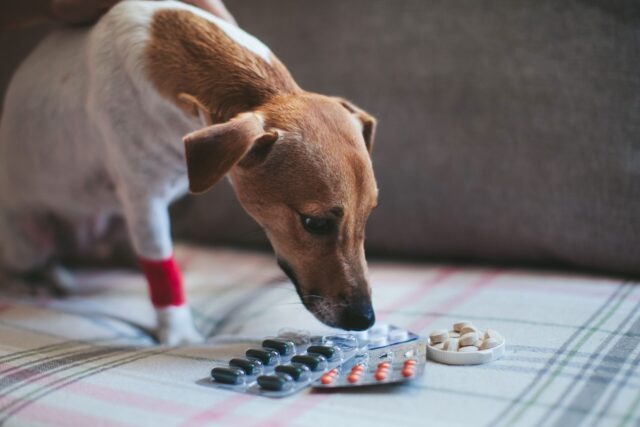
Can dog diarrhea be an emergency?
Dr. Mike Paul, DVM, a veterinarian with more than 35 years of experience caring for companion animals, warns, “With small bowel diarrhea you are more likely to see large volumes or watery diarrhea which can quickly lead to significant dehydration and electrolyte imbalance.”
How to Treat Dog Diarrhea at Home
If your dog is experiencing a case of liquid poo that can be safely treated at home, here are some dog diarrhea home remedy tips to try:
Pick Up the Dog Dish
Withhold food for 12 hours. No snacks, no treats, no food of any kind! Give your hound’s gut a break and let everything empty out for a fresh start. For small dogs and dogs with medical issues, clear this with the vet. For diarrhea in puppies and seniors, dog parents should check with the vet at the first signs of bowel changes as the young and the old have a harder time recovering from severe diarrhea.
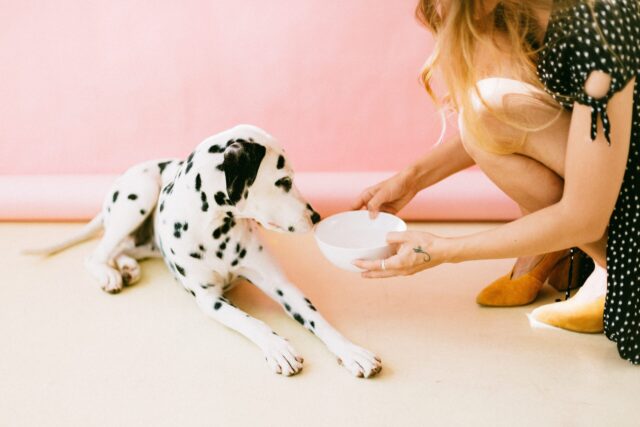
Keep Hydrated
Help your dog stay hydrated. Offer fresh water regularly. Many dog parents wonder if they can give their dog Pedialyte to help with diarrhea dehydration. According to the American Kennel Club, you can!
“If your dog is not vomiting, you can try giving him an electrolyte-enhanced fluid like Pedialyte. It’s best to check with your veterinarian for dosage recommendations.”
Bland Food
When it’s time to bring the food bowl back, be sure to offer your dog a bland diet to soothe their rumbly belly. Think the blandest of the bland and what do you come up with? Cooked chicken and white rice with no seasonings. The ultimate comfort food for sick dogs!
Here’s a list of other tender tummy-friendly foods to help stop dog diarrhea:
- White rice served on its own
- Rice water – Boil rice for 20 – 30 minutes and reserve white liquid left behind after straining out the rice
- Canned pumpkin – Fun fact: pure pumpkin (not pumpkin pie) is good for diarrhea and constipation
- Boiled potatoes, ditch the skin
- Lean meats or plain egg
- Yogurt or cottage cheese for dogs who tolerate dairy
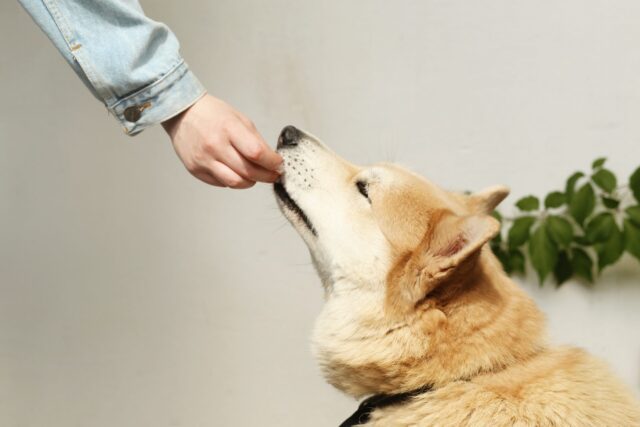
Probiotics
Probiotics are good bacteria that regulate digestive health in both dogs and humans. In addition to boosting the immune system, probiotics aid digestion and soothe inflammation in the intestines, which in turn helps treat the issues causing diarrhea. Feeding your dog yogurt can help introduce probiotics to the gut.
Fiber
Fiber also balances the digestive tract in dogs. By adding heft to stools, fiber makes for easy passing and also absorbs water to help dry up runny poop. Pumpkin is a natural source of fiber and can be fed to your dog by simply opening a can of pure pumpkin and adding some to their dinner.
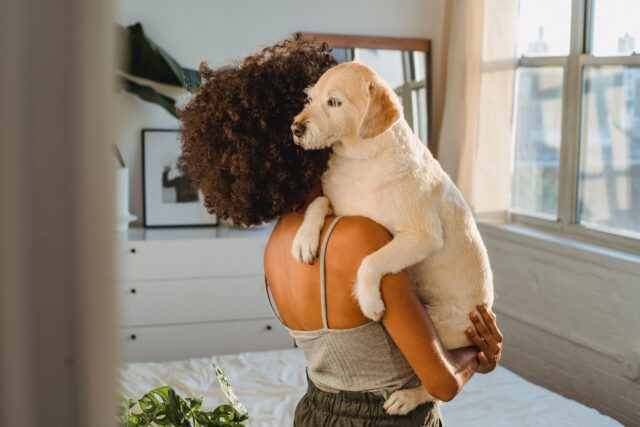
Tips for treating dog diarrhea at home at a quick glance:
- Withhold food for 12 hours.
- Offer fresh water regularly to maintain hydration.
- Feed a bland diet.
- Introduce probiotics and fiber.
- Call the vet if diarrhea lasts or your dog is acting ill.
You know your dog best and if you feel something is just not right, never hesitate to reach out to the vet clinic. These caring professionals are there to guide you through the slipperiest of situations when it comes to canine health, dog diarrhea included.
 Toledo, United States.
Toledo, United States.